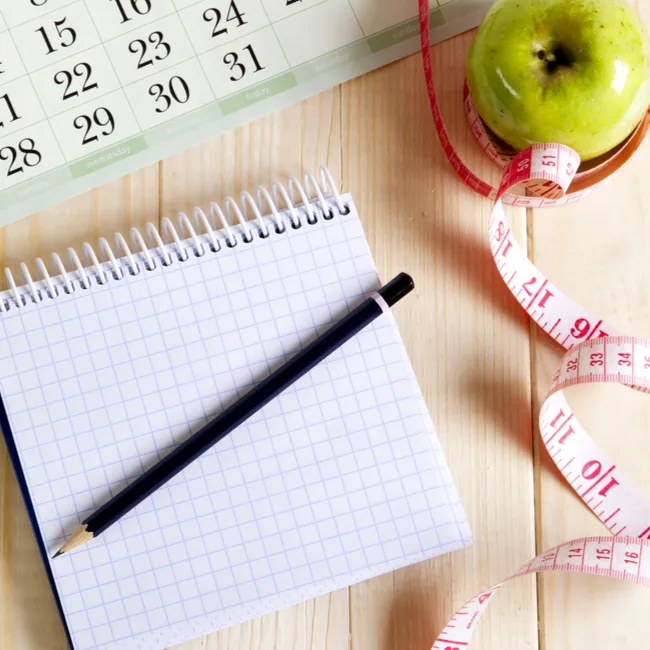 Losing weight healthily doesn’t happen overnight, and is possible with the help of a balanced diet, regular exercise, ample hydration and a consistent sleep schedule. When focusing on all of these aspects to better your health, dietitians say there is one helpful rule or tip to follow before preparing your meals that can help your diet become more weight loss-friendly. Read on for insight, advice and suggestions from Dana Ellis Hunnes, PhD, MPH, RD, senior dietitian at UCLA medical center, Trista Best, MPH, RD, LD, registered dietitian at Balance One Supplements, and Lisa Richards, registered nutritionist and creator of The Candida Diet.
Losing weight healthily doesn’t happen overnight, and is possible with the help of a balanced diet, regular exercise, ample hydration and a consistent sleep schedule. When focusing on all of these aspects to better your health, dietitians say there is one helpful rule or tip to follow before preparing your meals that can help your diet become more weight loss-friendly. Read on for insight, advice and suggestions from Dana Ellis Hunnes, PhD, MPH, RD, senior dietitian at UCLA medical center, Trista Best, MPH, RD, LD, registered dietitian at Balance One Supplements, and Lisa Richards, registered nutritionist and creator of The Candida Diet.
 While you might have an idea of what you want to eat for breakfast, lunch and dinner when preparing for your day ahead, utilizing a food journal can help you keep track of not only exactly what you eat, but also portion sizes and amounts. Keeping organized, detailed lists that you can refer back to can greatly aid your weight loss journey by helping you feel more on track, Richards says. In addition, doing this can also help you find the foods that help you feel best after eating, and others that might not.
While you might have an idea of what you want to eat for breakfast, lunch and dinner when preparing for your day ahead, utilizing a food journal can help you keep track of not only exactly what you eat, but also portion sizes and amounts. Keeping organized, detailed lists that you can refer back to can greatly aid your weight loss journey by helping you feel more on track, Richards says. In addition, doing this can also help you find the foods that help you feel best after eating, and others that might not.
Richards explains that “when temptation to slide back into old habits hits you,” it can be helpful to “have something to reflect back on as a reminder.” This doesn’t have to be a classic diary, she says, as it “can be a note, a picture, or anything else that reminds you of why you started putting your health first through your diet.” This can also help you avoid “fad diet pitfalls that result in rapid weight loss,” she notes. Rebound weight gain, she adds, is a “big hurdle for those initially wanting to lose weight.” A diet “focused on whole foods with most common allergens removed can help boost metabolism and speed along sustainable weight loss,” she continues, and keeping a food journal can help you accomplish this.
 A food journal can also help your relationship with food become healthier, Best says, as you can gain a better understanding of your own needs and goals. “Mental health approaches to weight loss are almost, and in some cases more, important for obesity treatment and prevention than traditional medical treatment,” she says. Best adds that “speaking to a mental health provider on the topic of food and weight can be the best first step to obesity treatment,” and many will suggest keeping a journal.
A food journal can also help your relationship with food become healthier, Best says, as you can gain a better understanding of your own needs and goals. “Mental health approaches to weight loss are almost, and in some cases more, important for obesity treatment and prevention than traditional medical treatment,” she says. Best adds that “speaking to a mental health provider on the topic of food and weight can be the best first step to obesity treatment,” and many will suggest keeping a journal.
“Mindful eating, also known as intuitive eating, may be a necessary practice to integrate into your eating habits as well,” Best continues (and you can add this advice to your journal!) Your stalled weight loss, she points out, could be “a result of eating when you’re not physically hungry, eating past your hunger, or any of the other principles that mindful (intuitive) eating shares.” Mindful eating revolves around eating when you are truly hungry, Best says, and keeping track of this can help you understand your own metabolism, hunger cues, etc.
Visit food paper bag homepage for more details.
Hunnes stresses that when it comes to weight loss, she “doesn’t believe in deprivation,” as “walking around hungry is not fun and is a setup for failure.” She recommends “thinking of foods as a lifestyle that you intend to follow lifelong, as it takes you out of the mindset of yo-yo dieting, or crash diets and then going back to your prior way of eating.”
 When making notes for yourself in your journal, Hunnes says to “switching to a whole-food, plant-based diet gives you an abundance of healthy nutrients, lower calories, and more water (anti-inflammatory foods), and is low in salt and higher in potassium. (Whole grains, nuts, seeds, legumes, fruits, vegetables).” This switch, she notes, “can result in several pounds of water weight loss off the bat and is healthy and a lifestyle change that is sustainable for weight loss and maintenance where you’re not walking around hungry.”
When making notes for yourself in your journal, Hunnes says to “switching to a whole-food, plant-based diet gives you an abundance of healthy nutrients, lower calories, and more water (anti-inflammatory foods), and is low in salt and higher in potassium. (Whole grains, nuts, seeds, legumes, fruits, vegetables).” This switch, she notes, “can result in several pounds of water weight loss off the bat and is healthy and a lifestyle change that is sustainable for weight loss and maintenance where you’re not walking around hungry.”
Overall, slow and steady wins the race when it comes to weight loss, Richards concludes, as “sustainable weight loss methods will typically result in a 1 to 2 pound loss per week.” It is important to focus on “sustainable weight loss methods” because extreme methods that may be effective initially will “ultimately result in rebound weight gain,” she warns. “Some of the best approaches to weight loss do not require significant calorie restriction, long exercise periods, or cutting out major food groups or macronutrients,” Richards adds, pointing to a food journal as a great next step for your journey.
Comments
No comments yet. Be the first to react!